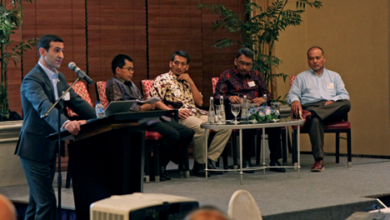Wirelines
Industry details concerns with NOAA expansion of marine sanctuary boundaries
On 19 August, IADC and other industry groups submitted comments to the US National Oceanic and Atmospheric Administration (NOAA). The comments addressed the draft environmental impact statement (DEIS) for the proposed actions of boundary expansion and application of existing regulations and management plan actions to new geographic areas of the Flower Garden Banks National Marine Sanctuary (FGBNMS).
The comments were submitted along with API, the National Ocean Industries Association (NOIA), the Independent Petroleum Association of America (IPAA), the International Association of Geophysical Contractors (IAGC) and the Offshore Operators Committee (OOC).
The FGBNMS was designated in 1992 and, in the 24 years since, industry has successfully co-existed within and around it and is vested in the health of the FGBNMS.
The associations noted that nearly a quarter of America’s oil and natural gas is produced from the Gulf of Mexico.
Extending the boundaries as proposed, and beyond those recommended by the Sanctuary Advisory Council and the Boundary Expansion Work Group, would likely result in substantial impacts to the exploration, development and production of oil and natural gas resources, undue restrictions on seismic surveys, and reductions in available pipeline corridors.
The letter detailed several critical areas of concern with the draft, which was included in the 10 June 2016 Federal Register.
Specifically, the associations identified seven key areas of concern:
• New proposed areas are neither of “special national significance” or “unique,” as required by the National Marine Sanctuaries Act;
• The proposed boundary delineations are excessive;
• The economic evaluations cited by the DEIS are inadequate;
• The threat and risk assessment for oil and natural gas is overstated by the DEIS;
• Extensive existing regulatory framework already provides adequate protections;
• A lack of clarity regarding how other agencies will regulate oil and natural gas activities in new areas; and
• The NOAA’s ability to implement its sanctuary management plan for expanded areas is uncertain.
The letter concludes, “The associations do not support an expansion of the Flower Garden Banks National Marine Sanctuary at this time due to the lack of scientific basis for benefits, expected high negative effects on the economy and energy production, and lack of justification to satisfy statutory requirements under the National Marine Sanctuaries Act.
“NOAA has not conducted adequate analyses as required under NEPA (National Environmental Policy Act), has failed to follow an open, transparent process, and has disregarded the reasonable expansion recommendations put forth by the Sanctuary Advisory Council, which included significant stakeholder input.
“The associations urge NOAA to cease work on the draft environmental impact statement, define a more reasonable set of alternatives, work with BOEM (Bureau of Ocean Energy Management) and industry stakeholders to more fully analyze the impacts of these new alternatives, and re-issue a draft that meets National Environmental Policy Act requirements and allows for informed comment and decision-making.”
Click here to access the 10 June Federal Register.
Siv Hilde Houmb represents IADC at meeting highlighting cyber threats targeting offshore, maritime industries
IADC represented the drilling industry at a meeting on 19-20 July that was organized to discuss cyber threats to maritime transportation systems. Dr Siv Hilde Houmb, Chairwoman of the IADC Cybersecurity Subcommittee and Chief Technology Officer for Secure-NOK, and Melissa Mejias, IADC Legislative Analyst, participated on behalf of IADC.
The meeting was arranged between the National Maritime Intelligence-Integration Office, the Maritime Administration, the US Department of Transportation and the US Coast Guard. It was held at the Johns Hopkins University Applied Physics Laboratory in Laurel, Md.
The meeting was organized to highlight a sampling of potential cyber threats that target the maritime and offshore industry and included discussion on high-impact vulnerabilities, prevention and remedies. It provided an opportunity for maritime and offshore industry representatives to engage with maritime stakeholders within the US federal interagency and gave attendees a platform to articulate issues.
Dr Houmb presented on behalf of IADC. She detailed the 2016-2017 work plan of the Cybersecurity Subcommittee, alongside presenters from US government agencies and other members within the maritime and offshore industry sector.
The IADC Cybersecurity Subcommittee recently released the IADC Guidelines for Assessing and Managing Cybersecurity Risks to Drilling Assets.
Click here to purchase the IADC Cybersecurity Guidelines
BOEM issues 1st gulf of Mexico report since 2009
The US Bureau of Ocean Energy Management (BOEM) recently issued a report, “Deepwater Gulf of Mexico December 31, 2014.” It contains information on oil and gas activities in the Gulf and is not limited to deepwater. It is the 10th report from BOEM highlighting oil and gas activities in the Gulf of Mexico and the first since 2009.
BOEM stated: “Because of the importance of oil and gas development in the deepwater Gulf of Mexico, BOEM has resumed this systematic compilation of information and statistics from deepwater activities, from leasing through production.”
Click here to download the BOEM report (file is 23.8 MB).




